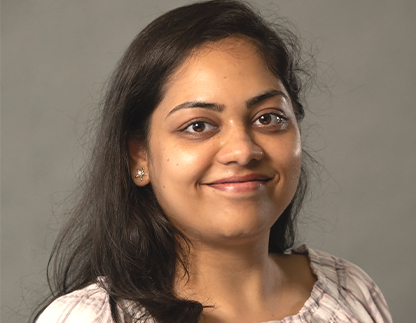Life is like a ship. You are the captain, sure, but you cannot control the weather or the sea. Your job is to steer the ship in the best possible direction, given the conditions.”
Sneha Kachhara
Postdoctoral Fellow in the Department of Molecular Biosciences

Sneha Kachhara is a postdoctoral fellow in the Department of Molecular Biosciences in the Weinberg College of Arts and Sciences. She serves as the administrative coordinator for the Northwestern University Postdoctoral Association (NUPA), as well as a member of the social media committee for American Physical Society’s (APS) Topical Group on Statistical & Nonlinear Physics.
How would you describe your research and/or work to a non-academic audience?
I am interested in systems that change in time; so-called dynamical systems. This could include anything from the climate to social structures to stock market trends, but I am currently focusing on biological rhythms; for example, how living cells (and organisms at large) adapt to changes in day-night cycles. I design, run and analyze numerical simulations to understand these systems.
What is a mistake you have learned from in your career?
I think the biggest mistake I made was to hide my mistakes. I would try to present only the best results to my advisors, thinking that was the only measure of progress. Over time I learned that it is important to discuss where you are stuck—the dead ends you are running into—because feedback and suggestions lead to progress. It seems obvious in hindsight, but it was difficult to own my mistakes and seek help.
What do you find both rewarding and challenging about your research and/or work?
Writing and presenting research. It is rewarding to successfully convey your work to colleagues and beyond, but it is also the most challenging. It is something that comes up again and again in the form of grant writing, talks and seminars, etc. Every time the context and the audience changes, so it is something that you have to continuously keep working on.
What is the biggest potential impact or implication of your work?
I like to think it would improve the quality of life for humans. My work is but a tiny fraction of the research into biological phenomena, but my hope is that it counts.
What books are on your bedside table?
Where the Forest Meets the Stars by Glendy Vanderah and Midnight’s Children by Salman Rushdie. I generally do not read fiction, but I enjoy discussions on books. So I am reading the first one along with a dear friend and the other one for the monthly book club organized by NUPA.
What did you originally want to be when you grew up?
Owner of a grocery store! All my younger self wanted was an infinite supply of 2-minute noodles and potato chips, so owning the store made total sense (still seems like a good idea).
What advice would you give your younger self or someone considering a similar path?
Owning the grocery store is much more than getting an infinite supply of noodles and chips! But jokes aside, I would assure them that they don't have to carry the world on their shoulders. Life is like a ship. You are the captain, sure, but you cannot control the weather or the sea. Your job is to steer the ship in the best possible direction, given the conditions. It is all there is to do. Same thing goes for PhD.
Tell us about a current achievement or something you're working on that excites you.
I am working on a semi-personal project that involves climate change and its impact. I always wanted to understand how the climate works. It is really sobering to see the facts. I hope we do something about it.
Tell us about a time when things did not go as you planned, what did you learn?
My lab shifted to a different institute (in a distant city) in the middle of my PhD. It was difficult to move away from family, friends, and above all the culture-shock! But it also opens your eyes to the similarities we share as humans, regardless of language, culture, religion, and climate. I learned that we are all essentially the same, with the same fears and insecurities. We all look for connection and belonging.
What are you most proud of in your career to date?
Getting into grad school. It was a long shot and took a few attempts to get into one of my top choice schools. I didn't know what it would be like going in, but I liked research enough to keep trying. It was totally worth it.
Publish Date: January 4, 2024
If you know a graduate student, postdoctoral fellow, graduate faculty member, staff member, or a member of our TGS alumni population who would make a great candidate for our TGS Spotlight Series, please complete this brief TGS Spotlight Series Nomination Form.